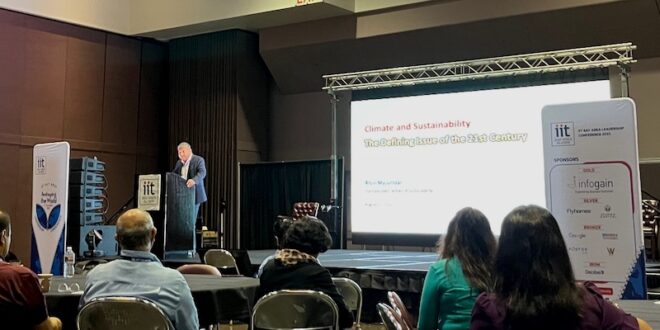
Indian immigrants seeking further education in US institutions and high-tech jobs in Silicon Valley have enriched the diversity and vibrancy of the San Francisco Bay Area. One institution in India has achieved strong name recognition, even outside the Indian immigrant community, and that is the Indian Institute of Technology (IIT). IIT comprises multiple campuses, with the first established in May 1950 in Kharagpur, six more after (that make up the seven old IITs), and then sixteen more were established after 2004. Notable IIT alums in the Bay Area include Sundar Pichai (CEO of Google parent company, Alphabet) and Vinod Khosla (legendary VC and founder of Khosla Ventures), amongst many others.
In total, there are about 45K IIT alums in the US, with one-third of those in the Bay Area alone, which makes the IIT alumni chapter in the Bay Area one of the most prominent globally. And on Saturday 26, 2022, IIT Bay Area held its Bay Area Leadership Conference with the theme of “Reshaping the World in Transition.” About 700 registered for the event; by my estimate, about 500-600 were in attendance.
Having spent the better part of my last 30 years in the SF Bay Area, I’ve had the pleasure of working with and befriending many IIT alums. It was remarkable to see the energy and buzz of many exceptional minds and talents gathered at the Santa Clara Convention Center on a Saturday. Running a small analyst firm, it’s always interesting for me to understand what leading technology communities believe are trends worth tracking. If you peruse the agenda, as I did, you’ll find discussions around sustainability, digital transformation of existing industries like food preparation and real estate, AI/ML, quantum computing, crypto and NFT, semiconductors and electronic design automation (EDA), multicloud, and social media. The schedule represents a kaleidoscopic view of today’s hottest trends, as you might find at other tech conferences.
Personally, while many of the expert presenters provided interesting viewpoints across the gamut and yielded nuggets of information, the keynote by Professor Arun Majumdar, the inaugural dean of the newly established Stanford Doerr School of Sustainability, had a significant impact on me. Sure, as analysts, we discuss ESG (environmental, social, and corporate governance) initiatives with telcos, hyperscalers, and vendors — and increasingly so. But at a personal level, Dean Majumdar’s presentation hit home.
Key takeaways for me from his presentation:
- It took us 1M years to get to 0.3B people on earth, but it’ll only be 13 years to add the next billion people.
- Multiple tsunamis will impact the earth’s future: the human consumption tsunami, the energy consumption tsunami (to power our needs), and the carbon dioxide tsunami (from the energy generation).
- Along with that, pollution-related metrics like our plastic and general waste generation.
- Trying to keep the wet bulb temperature to no more than 1-2 degrees increase in the next 20 years is a challenge, and we have about 20 years left to reduce carbon dioxide emissions by 800 Gigatons, which translates to 40 Gigatons a year — and we don’t know how to get there.
- While there are positive signs in commitments from countries at the United Nations Climate Change Conference in 2021 (COP26), we need to take personal action. We will want to take a hard look at what we eat, what we buy, how we consume (consumer goods, clothing), what energy sources we tap, and where we drive innovation.
Dean Majumdar astutely appealed to the entrepreneurial nature of the audience, sharing that legendary venture capitalist, John Doerr, believes there’s invention and industry in sustainability, with money to be made while saving our environment. John and Ann (his wife) Doerr contributed $1.1B to establish Stanford’s first new school in 70 years, the Stanford Doerr School of Sustainability, to help tackle the urgent climate and sustainability challenges we face today. Along with them, other contributors, including Yahoo! founders and Stanford alum Jerry Yang and his spouse, Akiko Yamazaki, along with David and Angela Filo, have joined, and the school launched with $1.7B in funding.
For me, the biggest takeaway from this conference of some of the leading engineering minds in the Bay Area (and the world) was the importance of sustainability, and it’s now an even more important lens for us at AvidThink as we continue to cover and analyze the technology infrastructure market.
Thanks to the IIT BayCon organizers for the invitation (that’s you, Anshu Agarwal)!
